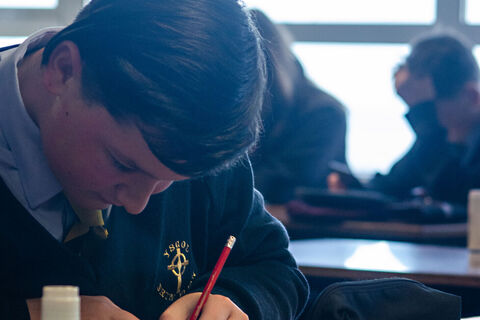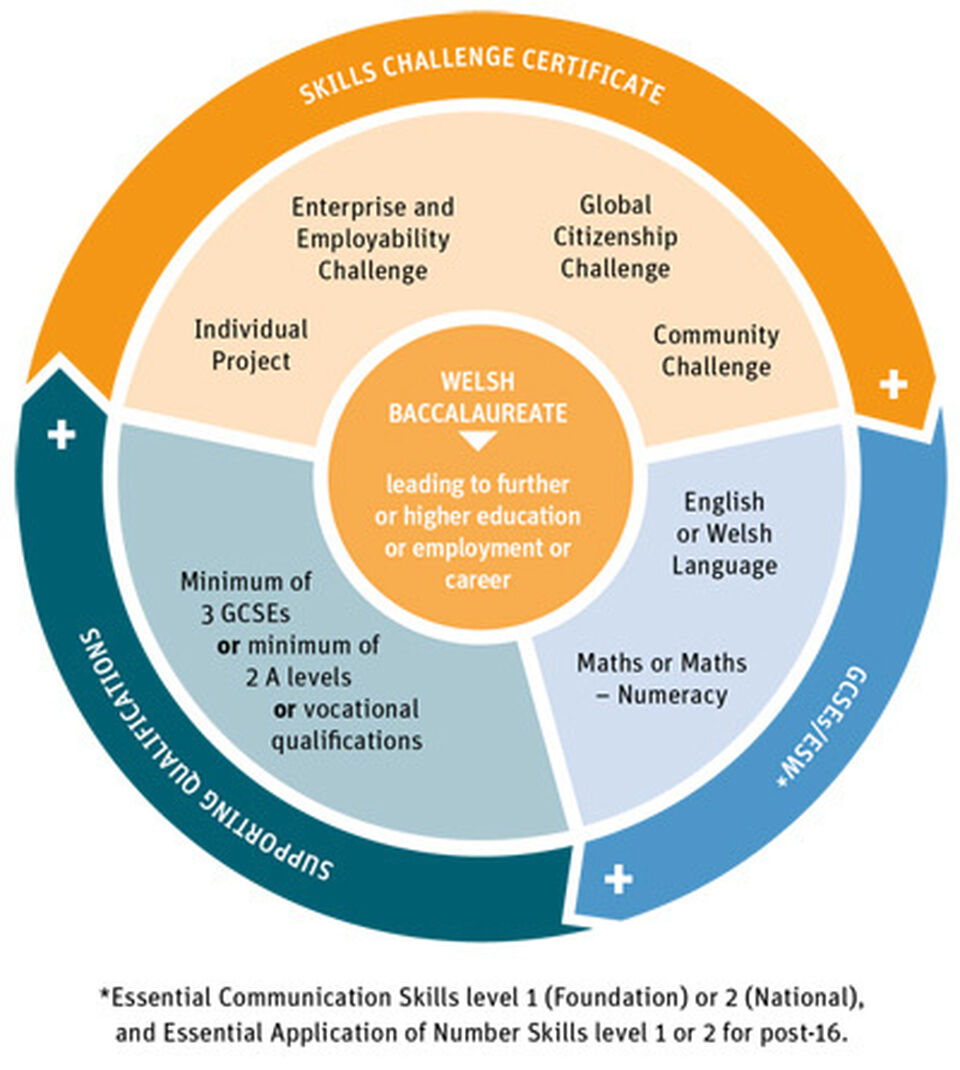

Welsh Baccalaureate Department Vision
The Welsh Baccalaureate Department is made up from teachers across a wide range of disciplines working together to offer our pupils a variety of expertise, experiences and support to apply their skills in real life situations and become valued and valuable informed citizens. Learners all participate in the Welsh Baccalaureate (WBQ) at KS4 and KS5 level by completing the Skills Challenge Certificate (SCC) or Advanced Skills Baccalaureate Wales (AdSBW). These will develop qualities such as planning and organisation, personal effectiveness, creativity and problem solving as well as embedding the skills of literacy, numeracy and digital skills in challenges/projects they complete. The Welsh Bacc. department aims to provide learners with the confidence and skills toolkit to apply themselves effectively in the next stage of their lives, from academia to employment. Moreover, we aim to instil in our learners a sense of responsibility so they can actively take a role in their own future and create a more sustainable global society.
Introduction to Welsh Baccalaureate
The Welsh Bacc. can be achieved at three levels:
At levels 1 and 2 the Welsh Bacc. can be gained on the completion of the Skills Challenge Certificate (SCC), which is a standalone graded qualification valued alongside GCSEs, and by achieving the required level in supporting qualifications (shown in the Diagram below). The SCC can be achieved and awarded without the supporting qualifications that comprise the Welsh Bacc. The SCC consists of four components (one mandatory Project and two out of the three Challenges):
At level 3 the Advanced Skills Baccalaureate Wales (AdSBW) qualification supports learner progression into higher education, apprenticeships, training and employment and provides a framework for examining complex issues defined by the Well-being of Future Generations Act (Wales). Learners will use the WJEC Digital Student Course Companion – My Journey – to record their integral and embedded skill development.
The AdSBW is graded alongside other Level 3 qualifications such as A’ Levels and provides learners with comparable UCAS points upon completion. The AdSBW consists of three projects:
STAFFING, DEPARTMENT RESPONSIBILITIES AND ADDITIONAL RESPONSIBILITIES
Mr Neil Tuck (NRT)
Progress Leader for AdSBW and Skills Challenge Certificate, Teacher of Business
Dr Sian James (SEJ)
Progress Leader for Humanities, Teacher of AdSBW and Skills Challenge Certificate, Teacher of Humanities (Humanities specialist), Teacher of Tourism, Sustainable Development Coordinator
Mr Richard Dennis (RD)
Progress Leader for RVE / Religious Studies, Teacher of RVE / Religious Studies, Teacher of AdSBW and Skills Challenge Certificate
Mr Colin McKibben (CM)
Teacher of Humanities (History specialist), Teacher of AdSBW and Skills Challenge Certificate
Mrs Sarah Biggin-Jones (SBJ)
Deputy Headteacher, Teacher of History, Teacher of Skills Challenge Certificate
Mr Timothy Williams (TEW)
Teacher of Humanities (Religious Studies specialist), Teacher of Tourism, Teacher of AdSBW and Skills Challenge Certificate
Mr Sebastian Davy (SD)
Teacher of Modern Foreign Languages, Teacher of AdSBW and Skills Challenge Certificate
In addition, the SCC is taught through the following specific departments in Year 10:
Curriculum
Year 10 and 11
KS4 learners complete the SCC across two years and are taught practical and critical skills which are developed over the course. The SCC allows students to enhance their knowledge and application of skills seen as increasingly important by employers and higher education. Successful completion of the SCC will result in a grade A*-C at level 2 (National level), or Pass/Pass+ at level 1 (Foundation level); learners also achieving the supporting qualifications needed will be awarded the Welsh Baccalaureate Qualification (WBQ).
In Year 10 learners complete two of the three following challenges:
Community
Learners plan, develop and carry out a 10 hour community project which will meet either a charitable aim, enhance the neighbourhood or provide mentoring/tutoring to others. They complete and analyse an audit of their skills, consider communities that need support, conduct risk assessments and make detailed action plans for their project. The project is then evidenced through photographs, written accounts and student evaluation of their performance.
Global
Learners develop an in depth understanding of a global issue, such as homelessness, through critical analysis of resources provided. They then develop their own personal standpoint and create a raising awareness pack about the issue; this could include campaign posters, songs, blogs, leaflets etc. Finally, they evaluate their performance in the challenge through a written reflection.
Enterprise and Employability
This provides opportunities for learners to develop their enterprising skills and enhance their employability. Learners provide evidence of a skills audit, create groups to develop an enterprising idea which is then presented as a visual display. Minutes of group meetings are kept, students pitch their ideas to potential customers/clients and develop financial awareness through budgeting and cost analysis of their ideas. Finally, learners reflect on the success of their group, their personal role and the development and application of their skills within the challenge.
Each of the above Challenges is worth 25% of the overall SCC, students will complete all three challenges, then the two highest grades out of the three will be selected for submission to WJEC for consideration for the SCC.
In Year 11 learners complete the following challenge:
The Individual Project (IP)
The individual project allows learners to research in depth an area of personal interest or one related to their future career or educational aspirations. Learners are encouraged to select complex issues and develop the skills needed to research such as planning and organisation, handling and presenting data and information, critical thinking, problem solving and communication and digital literacy skills. The evidence for assessment is either a written dissertation 1,000-3,000 words long, with or without a product/artefact to support their findings. The IP is worth 50% of the overall SCC.
Sixth Form
Years 12 and 13
At KS5 all learners complete the Advanced Skills Baccalaureate Wales (AdSBW) qualification which supports progression from the development of skills at Level 2, develops and engages students as life-long learners, develops independence, ownership and resilience and allows learners to take on more responsibility for their next steps into higher education, apprenticeships, training and employment. Learners will be encouraged to draw upon their diverse interests, experiences and cultures and exercise personal choice in their learning and assessment. The AdSBW is graded A*-E and carries a maximum of 56 UCAS points.
In Year 12 learners complete the following challenges:
Global Community Project
Learners will select a global issue, driven by the UN’s 17 Sustainability Goals and The Well-being of Future Generations (Wales) Act for which they will gather and critically analyse a range of secondary sources as part of a Research Review. They will then use this information to inform an audience about the global issue and relate it to a problem in Wales or the local area and produce a Persuasive Proposal to tackle the problem. Learners will then take part in 15 hours community action at a local, national or international scale to address the chosen global issue. They will plan and evidence their action through an Active Citizen Record and evaluate their involvement at addressing the issue.
Future Destinations Project
Learners explore realistic employment opportunities and pathways available to them. The Future Destinations Project allows learners to complete a self-assessment too in preparation for the world or work / further academic study and then create a plan from the outcomes looking at potential future employment opportunities. Learners also select one of the themes from the Wellbeing of Future Generations (Wales) Act to create a initiative proposal on how this can have a positive impact on others. Learners will collaborate with others for this project to embed teamwork skills and joint planning as essential values for their future.
Each of the above Projects is worth 25% of the AdSBW, learners must pass both and the IP to gain a grade overall. Learners are permitted one resit per project, with the highest mark achieved going towards the qualification grade. Learners resitting a project cannot resubmit evidence for assessment previously entered.
In Year 13 learners complete the following project:
The Individual Project (IP)
The Individual Project allows learners to develop research skills linked to their future career or educational aspirations. Learners are encouraged to select complex issues and have awareness of research helping to make informed decisions, the importance of originality and initiative and to exercise personal responsibility over their future. Learners will be supported by a supervisor who will approve their topic and provide support and guidance throughout the project, learners will evidence three critical meetings with their supervisor to plan the project, gather and analyse information and present their project for review and feedback. The evidence for assessment is either a written research project (approximately 5,000 words) or to develop an artefact with an accompanying research report (approximately 1,500 words) and development record. Learners will also produce a self-evaluation. The IP is worth 50% of the overall AdSBW.
Careers and Opportunities
Completing the Welsh Baccalaureate at Foundation/National or Advanced level will provide a foundation for a range of further/higher education courses, apprenticeships, the world of work and self-employment. The courses were developed in consultation with employers and universities to offer the skills needed to succeed in the workplace and in higher education. Many universities offer places to students who achieve the AdSBW as equivalent to A levels, they also value the skills undertaken as enhancement to personal statements and at interview. Increasingly students who have completed Welsh Bacc. courses pursue career paths including law, charitable work, civil service, the military, management, research, teaching, art and design, web design and ICT. In addition, students who have completed community challenges/project with local and national organisations find they not only have enhanced CVs but also employment opportunities, offers and contacts as they leave school.
Useful Websites
Welsh Baccalaureate | GOV.WALES
Welsh Baccalaureate National/Foundation Skills Challenge Certificate (wjec.co.uk)
